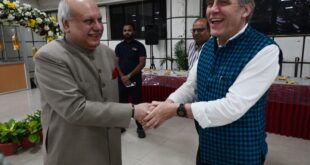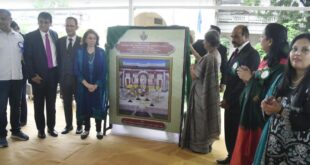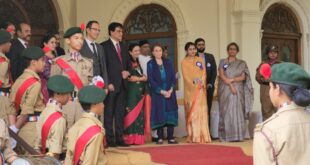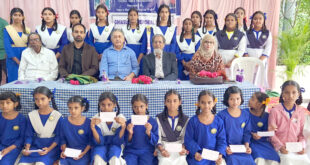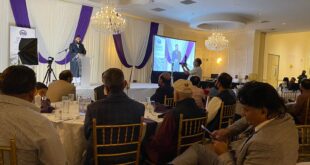Hyderabad, October 6: “Hyderabad was the centre of India, almost as far as the British states were concerned. It produced nothing but excellence since 1884, regarding the public service and development sector”, said Advisor to UNESCO, renowned educationist and Former UNESCO Director in Human Resource Development, Management and Planning, Dr. Mir Asghar Hussain.
He was addressing the gathering on 86th birthday of Eight Nizam of Hyderabad Nawab Mukarram Jah Bahadur at Purani Haveli in Hyderabad.
The Mukarram Jah School, named after the Eight Nizam and managed by the Mukarram Jah Trust for Education and Learning (MJTEL) observes 6th October, the birthday of Prince Mukarram Jah Bahadur as its Founders day.
Addressing the gathering of students and parents, Dr. Asghar said “Hyderbad was unique because it managed to keep its independence despite the British intervention, as the Nizams believed in state first, the rest after.”
He advised students to imbibe four principles in life viz. a viz. learning to know, learning to do, learning to live together and learning to be. He stressed that Education and culture are inseparable. Culture is going to unite or divide us on the future. He said “India’s strength comes from diversity. India has different religions, casts, languages and there cannot be one culture or religion as a favourite.”
The UNESCO Advisor also stressed on the importance of heritage. Times have changes, political regimes have changed but we have to not only look at the past but towards the future.
Speaking on the occasion in the royal confines of Masarath Mahal, the private palace of Sixth Nizam Nawab Mehboob Ali Pasha, which is now a part of the Mukarram Jah School inside Purani Haveli, Trustee of MJTEL Nawab Faiz Khan said “the Nizams greatly valued education, and institutions from the Osmania University to the Mukarram Jah Trust are testament to it.”
“After his coronation as the Eight Nizam, Prince Mukarram Jah gave away the Masarrath Mahal which was very dear to him as he shared a fond relationship with his great grandfather Sixth Nizam Nawab Mehboob Ali Pasha, and Masarath Mahal was the latter’s private palace, where the latter also received his early education as a child”, he said.
The Haveli itself houses seven palaces which are being restored to their erstwhile pristine glory. Three palaces were restored last year, while this year, the trust managed to restore two more palaces inside the Purani Haveli. Restoration of Masarath Mahal is underway. The facade and the arches have been restored completely. Restoration of the interiors will be completed within a few months, after which all the palaces will be painted at once to their original charm, said Mr. Khan.
The trust named eponymously after the Prince Mukarram Jah is bearing the expense for the restoration of these palaces, as after using the space inside Purani Haveli for education, the palaces were very dear to him, said Mr. Khan.
A poetic tribute to Prince Mukarram Jah in traditional Urdu poetry was recited on this occasion.
Secretary of the trust Mr. Khaja Ghiasuddin welcomed the guests while Principal Mrs. Rekha Wadhe presented a vote of thanks.
Besides being UNESCO’s former Director Dr Asghar is also the grandson of Nawab Fakhrul Mulk and the son of Mir Moazzam Ali and Meherunnisa Begum.
He advised students “to learn to manage to resolve conflicts and learn to live together” adding that “strength comes from collective society where we discover each other and uphold the Ganga Jamuna tehzeeb.”
He also said the Nizam might have been portrayed as a miser by some, but in reality he was very generous. Even during the transition of power from being a king to not being a king after 1949, the Nizam distributed their wealth very generously. Setting up the palaces for educational purposes for instance, is one of the many acts of royal generosity.
 Gawah (The Witness) – Hyderabad India Fearless By Birth, Pristine by Choice – First National Urdu Weekly From South India – Latest News, Breaking News, Special Stories, Interviews, Islamic, World, India, National News
Gawah (The Witness) – Hyderabad India Fearless By Birth, Pristine by Choice – First National Urdu Weekly From South India – Latest News, Breaking News, Special Stories, Interviews, Islamic, World, India, National News

